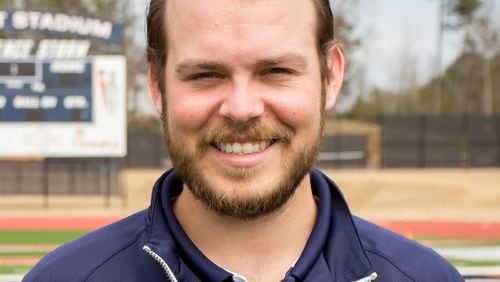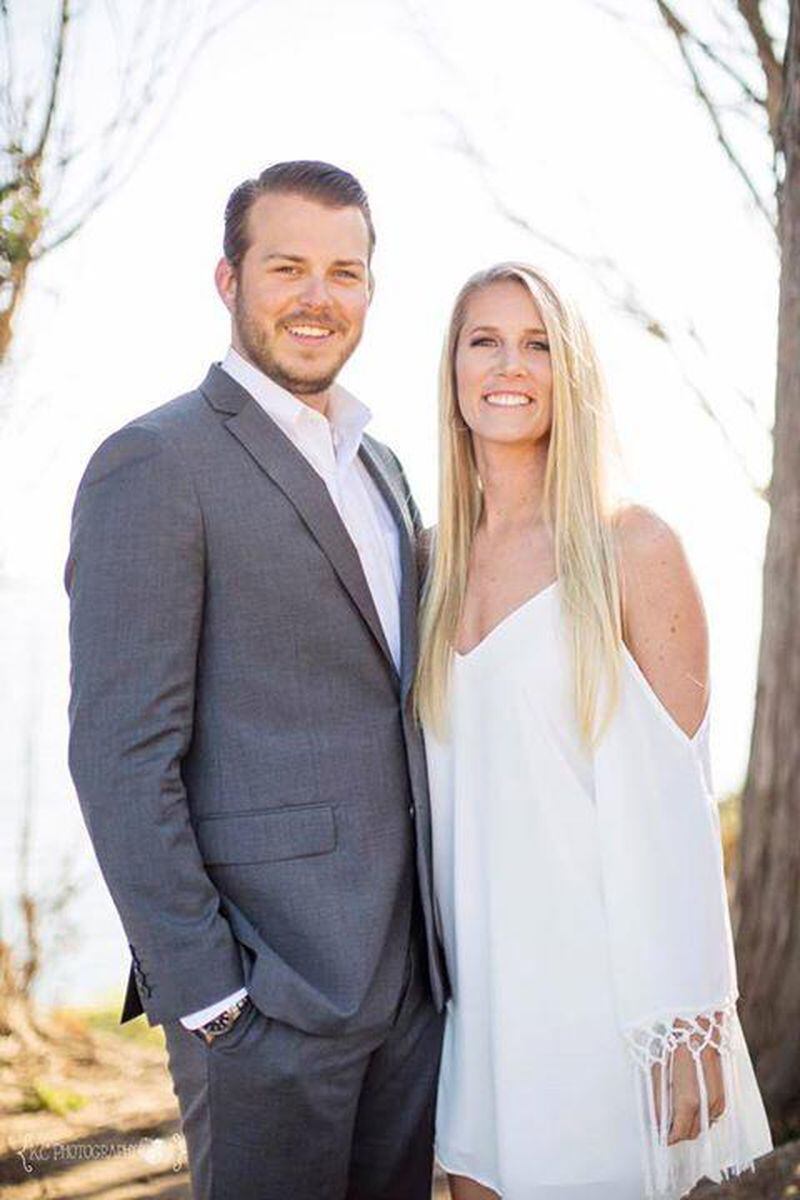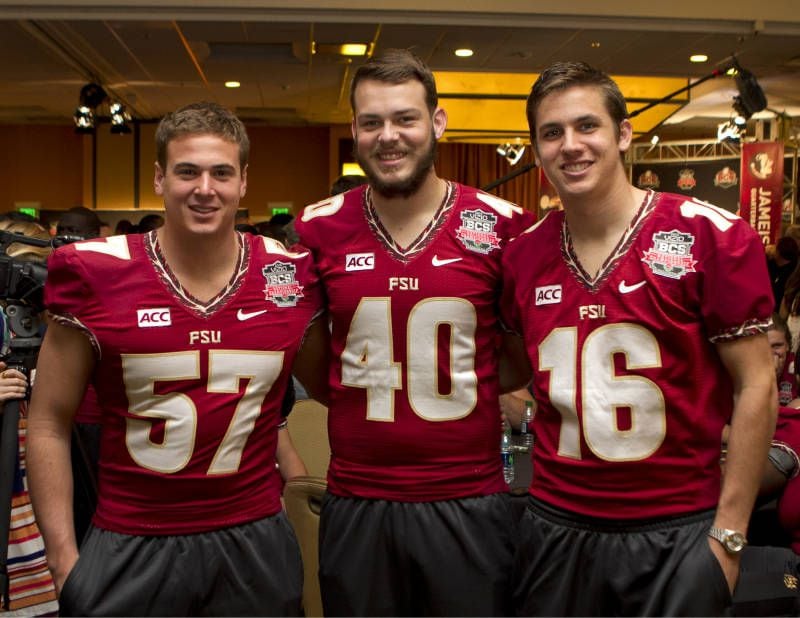Everything is looking promising for Parker Conley, the newly hired Providence Christian football coach. A new job, a new wife and a lazy post-wedding Sunday watching the Masters. Could it get any better?
Conley married former Buford and Georgia Tech softball standout Karly Fullem on April 8 and was back in the swing of things by Monday .
Credit: Seth Ellerbee
Credit: Seth Ellerbee
"Yeah the wedding was great," he said. "I am glad the rain got out of here, and we had a perfect day on Saturday and then we were lazy the rest of the weekend, so I can't complain. The new wife even let me watch the Masters, so I guess we are off to a great start."
A 2010 Norcross graduate, Conley, 24, is thought to be the youngest high school coach in the history of Georgia. After high school, Conley walked on at Florida State and played as a tight-end and wide-receiver for Jimbo Fisher on the 2013 National Championship team. FSU defeated Auburn in the title game that season, 34-31.
Credit: Seth Ellerbee
Credit: Seth Ellerbee
Coaching runs deep in Conley’s family. His father is a private baseball instructor at the Norcross Sports Training Academy. His grandfather, Bill Conley, was the coach at Lovett from 1963-1976 and the athletic director for 33 years. Lovett’s Conley-Oakley Field was named in his honor. It is safe to say that the Providence Christian Storm are in good hands.
Conley took time Tuesday to answer a few questions on life, football, and other things:
Q. What pressures are you facing as a 24-year-old coach?
A. The desire to win and get better is always there. But my biggest thing is that I want my guys to know that we are going to do this thing together. It is not going to be that we have some secret formula. It is just going to be each person doing their job, including the coaching staff. It is the parents, the players, the coaches all working together to be the best teammate possible. And so my hope and prayers are that we can take that and run with it. It is how you conduct yourself on the field as well as off it. I am hopeful and anxious and excited for spring, and maybe we can get that ball rolling.
Q. At 24, is it difficult being someone’s “boss,” who might be much older and have been in the profession a lot longer?
A. I have had the pleasure of working with some older coaches. I have been talking to a lot of the staff and figuring out who would be the best fit and where. But in talking with them, I am letting them know that I am going to lean into them as well. Understanding that I don’t have the most experience, but what I do have the heart and the desire. That has been received really well, and I have appreciated that from a lot of the guys that I have had conversations with. Like, “Look, I am going to need you, and we are going to do this in a way that not only brings glory to God, but brings this family tighter.” I know there are a lot of people who have been coaching longer than I have been alive. It would be a shame if I did not use that -- if I thought that I had arrived, because in no way, shape or form have I arrived. And I know that there are guys who will be able to help me and help make this program the best it can be.
Q. Tell me about your grandfather, Bill Conley.
A. There were definitely a lot of times that I leaned into him. All through high school ball and into college, up until he passed away. I was picking his ear. I spent many nights on the Lovett sidelines watching games and learning from him. So absolutely, that was a huge source of strength and knowledge and just football IQ.
Q. What would you consider a success after year one?
A. Obviously, we want to win. I want to give these senior guys the best year of football they have ever had. But for me, a success is a group of guys next year, all of the middle-schoolers and underclassmen who have bought in. I don’t want to come next spring and have to be preaching the same stuff, you know. A success is to feel that my players and the community have bought in to the mission. I know it is going to be a bumpy ride and we are going to have to find a lot of success on and off the field in various ways. But just for me, to know that we set the mission, we set the bar and we are going to have guys pushing to move it upward.
Q. Speaking of those guys, tell me about your team.
A. I have been so unbelievably excited about how the seniors have taken this and gone with it. Before I was even named, they were calling “players only” meetings to let the underclassmen know that we are going to be alright and we are going to do this. Having those senior guys has made my job a little easier here in the last few weeks. I just shared my vision, and they got it and were all in. I think that we are going to have some great players coming out of the hallways. A lot of the conversations that I have had ... I love the opportunity to invest in these guys. I am hopeful that we will have a lot of fun in the spring and we will show the guys how incredible Providence football is.
Q. You are seven years removed from walking hallways just like them. How does being able to relate impact your coaching philosophy?
A. Well, I think it helps and it's definitely the strength I like to lean into. I like to joke with them that I am just as big of a kid as they are. But right now it is really easy for me to remember a lot of the feelings I had and remember a lot of the struggles and successes that I had to go through. I think that is something that will always be there. I can just as easily pull back on something I did in elementary school football as I did at FSU. And it is not like I am just going to run away from that now that I am coaching. That, to me, is how I get my style. How I get that drive. The feelings that I had, in finding success through difficulties, in going through the hard stuff. Just being able to do that now, so early, I think is just going to set the base and set the platform moving forward. It is going to make, kind of, the way that I love my players and the way that I pull for them, just that much stronger.
Q. Was coaching your desire as a profession?
A. It really wasn’t at first. Jokingly, I was always saying I should coach. I grew up at coaching camps with my dad, who is a baseball coach. I grew up helping out at football camps. Graduating school, I went into sales because I thought it would be great to deal with people and build relationships with people. But the more I spend time with students at church and camps, I realized that was the way I wanted to connect with people. And so that was really where God put on my heart that I needed to go into education and coaching. I just jumped all in with both feet and said this is where I have strength and this is where I want to impact people.
Q. What did you learn at FSU under Jimbo Fisher?
A. The biggest thing that I learned was that taking care of the little things will make the big things seem smaller. We stressed over and over that you need to be able to perform when tired. Everything we did in the weight room or the practice field, you have to be able to take care of those little things even when everything is hitting the fan. He would always say, "When pressure comes, habits rise to the surface." I want to bring that, and I have tried to share that with my guys. You can't just waltz through and expect to be successful. You have to go out there and do your job on each and every rep, each and every play. And in doing so, and everyone doing their job, the team will be successful. So getting to compete against and with some of the best players in the country, guys playing on Sunday . Getting to learn from some of the best coaches in the country, I just tried to absorb as much that they taught me. I am just trying to relay that now to kids who are very young in football, to kids who don't have a foundation to fall back on. Just teaching it from the get go that everything is building toward something else.
Q. Describe the relationship with the Providence fan base.
A. Well, I love walking through the high school hallways and just hugging on kids and high-fiving guys. Just connecting with them. When they made the announcement, just the excitement from the teachers and the students, and even the families, was unbelievable. I really didn't do it with coaching in mind; I did it because I want to be someone that these people and kids can lean into. To feel the immediate reaction and celebration has really made me feel like we can do this. To get the support from the administration and other coaches has really been a big push for me to say, "OK, let's move forward and make a run." My heart is always going to be to love everyone as hard as I can. My heart is to be able to share what God has given me and the experiences he has given me. To take young men and teach them what it is like to be someone who stands for something, who fights for something. The love and support brings so much excitement on Friday nights, but the work will be done Monday to Thursday . We are going to get after it. We are going to work hard. We are going to compete. We are going to do it the Providence way by glorifying God in everything that we do.
About the Author








